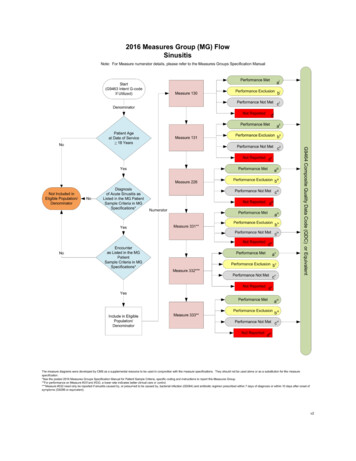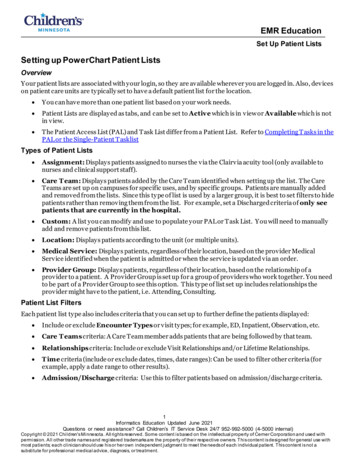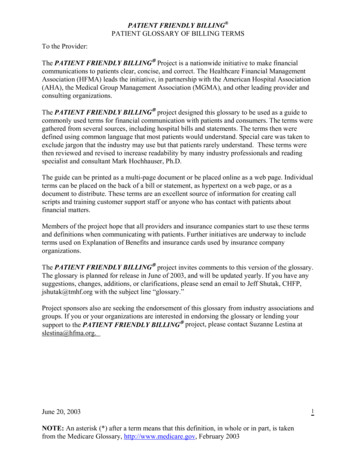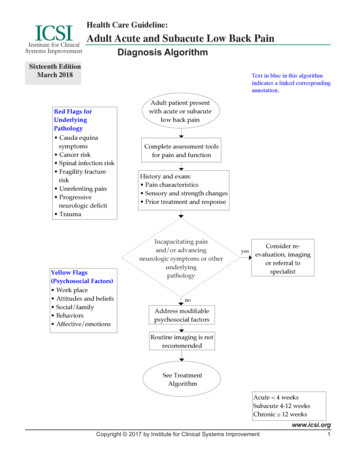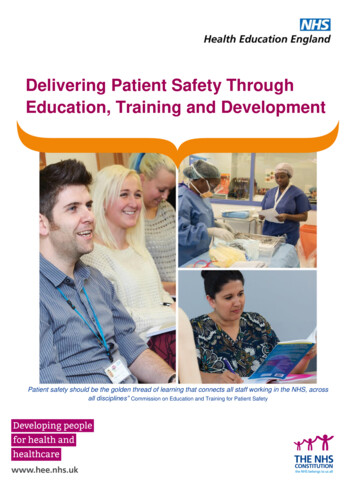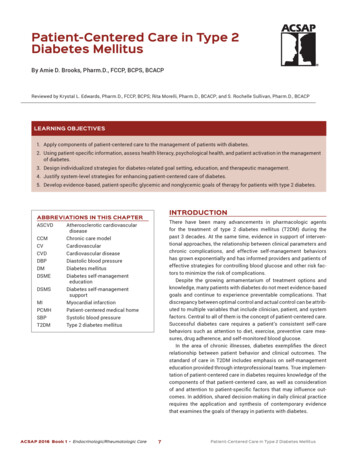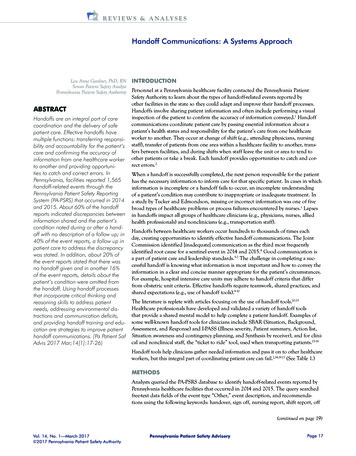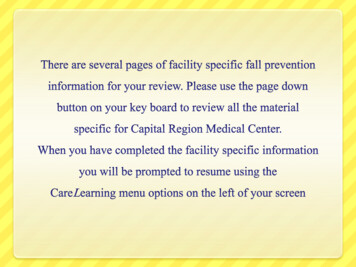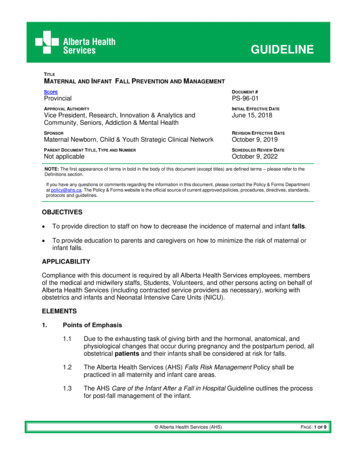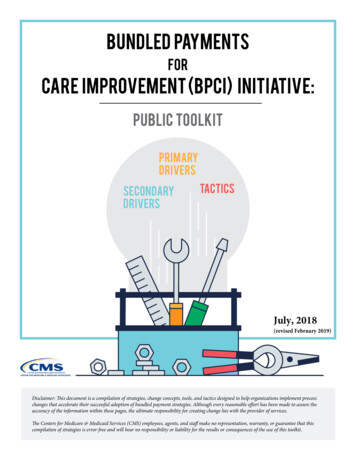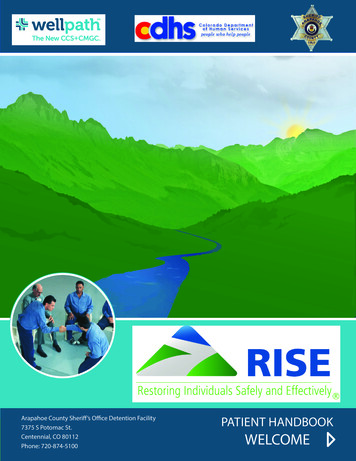
Transcription
Arapahoe County Sheriff’s Office Detention Facility7375 S Potomac St.Centennial, CO 80112Phone: 720-874-5100PATIENT HANDBOOKWELCOME
TABLE OF CONTENTS2Welcome9-10Patient’s Rights3About RISE / Mission and Vision11Patient Responsibilities / Patient andFamily Responsibilities4How We Will Help You in Your Recovery12Unit Rules / Safety5Individualized Treatment and the Conceptof Recovery / What Is “Recovery”?13Services6Program Orientation / Recovery Program14-15Visitation7Your Part in Your Care & Safety /Helpful Tips About Medication16Support & Education Resourcesfor Patients and Families8Pharmacy Services17Hand Hygiene and Infection ControlTABLE OF CONTENTS 1
WELCOME TO WELLPATHRISE PROGRAMOn behalf of Wellpath Recovery Solutions and the staff, I would like to welcome you to the RISE (RestoringIndividuals Safely and Effectively) Program. The Staff look forward to helping you and to making your stay aspleasant as possible. We will make every effort to provide you with the best therapeutic care, within a safeand secure environment. In order to provide you with the best treatment, we will need your participation andcooperation. It is especially important that you comply with your medication treatment from the doctor.As a patient of the RISE Program, you have rights and responsibilities, which this booklet explains. On your dayof admission, a staff member will go over the information in this booklet with you. Should you have questionslater about this information, do not hesitate to ask any staff member for assistance. Please keep this booklet foryour future reference.On the day you are admitted, you will be assigned a shared room on the unit. You will be provided with five daysof orientation to the structure of the program and to get to know your treatment team. Please work closely withyour treatment team members so that you can get the most out of your time in the RISE Program and feel free toexpress your concerns and make suggestions about how RISE Program can improve meeting the needs of thepatients. We value your opinions.We want to make sure that you are satisfied with the treatment and care you receive. Let us work together tomake your stay a productive one. We look forward to working with you.Sincerely,Dr. WallersteinDirector of Forensic ProgramsRISE PROGRAM7375 S Potomac St.Centennial, CO 80112General Information Telephone Number: 720-874-51002 WELCOME
About RISERestoring Individuals Safely and Effectively (RISE) Program is located in the Arapahoe County Sheriff’s OfficeDetention Facility in Centennial, Colorado which is about twenty miles southeast of Denver. RISE is operated byWellpath Recovery Solutions and is located in the county jail. The Arapahoe County Sheriff’s Office DetentionFacility is accredited by the National Commission on Correctional Health Care (NCCHC) and the AmericanCorrectional Association (ACA). Patients in the RISE Program are either waiting for their initial competencyevaluation or have been declared incompetent to proceed (ITP) by the State courts.Our goal is to help individuals committed to us to improve their mental health as quickly as possible so that theycan continue with their futures.Mission and VisionThe mission of RISE is to address the complex challenges of behavioral health issues of those involved in thecriminal justice system in an effective and efficient manner, through the utilization of evidence-based practices.Our vision is to be the leader in providing quality jail-based competency program and forensic psychiatric carethat anticipates and responds to the changing needs of the patients we serve. Our partnership with the ColoradoDepartment of Human Services and the Arapahoe County Sheriff’s Office presents a unique opportunity todirectly influence meaningful and lasting reform to the criminal justice system, while ensuring that valuabletaxpayer’s resources are utilized in the most effective and efficient manner possible.ABOUT RISE 3
How We Will Help You inYour RecoveryYou will be introduced to your treatment team on the day you are admitted. The members of the treatment teamwill meet with you to find out your needs, interests, and strengths. Together, you and your treatment team willdevelop the most appropriate treatment plan for you. The Treatment Team is made up of a psychiatrist, nurse,social worker, forensic psychologist, recreation therapist, reentry coordinator, and other individuals as required,such as a peer support specialist. Certain members of Treatment Team will meet with you when you are admitted to the unit, then weekly thereafter unless more often is necessary. During each treatment team meeting, youwill have the opportunity to review and discuss your progress with the treatment team and to make necessarychanges to your treatment plan.The Psychiatrist and Nurse will work with you to determine your medication needs. It is very important for yourmental health recovery that you take your medicines every day. Report to your doctor any side effects that youmay feel from your medicines.The Social Worker will assist you by scheduling visits with people you would like to visit you. This staff personwill also assist you in contacting official offices in the community.The Forensic Psychologist will work with you to help you better understand the legal aspects of your legal caseand to help you return to court to receive your court hearing.The Recreation Therapist will help you by determining your needs, interests, and strengths concerning yourmental health recovery. This help will prepare you for a possible return to a supervised community.The Reentry Specialist will help link you to community resources upon discharge from the program.The Peer Support Specialists are people living in recovery with mental illness and/or substance abuse. Theymay provide support to others whom can benefit from their lived experiences.4 HOW WE WILL HELP YOU IN YOUR RECOVERY
Individualized Treatment and theConcept of RecoveryYour unit has a treatment team that is responsible for working with you to help you improve your mental healthand daily functioning. You and your treatment team together will develop your own individualized treatment plan,which will focus on your present needs, strengths, interests and goals. The purpose of the plan is to help you setand achieve goals on your road to recovery. The plan will list the goals you need to accomplish and by what date.IT IS YOUR RESPONSIBILITY TO FOLLOW THE PLAN THAT YOU AND YOUR TREATMENT TEAM DEVELOP.THE TREATMENT TEAM CANNOT DO THE WORK FOR YOU. YOU MUST DO IT FOR YOURSELF.What is “Recovery”?It is very important to understand that “recovery” does not mean“cure”. Recovery means that you learn to control your mental illnessby changing bad habits and the things you used to do that madeyour illness act up. We want to help you be a “recovered personwith a mental illness.” The approach we use at RISE to help yourecover from your mental illness includes medication, individualand group therapy, psychotherapeutic programs, recreationalactivities, and clinical supervision.Please remember that your treatment team cannot help you“recover” without you doing your part. You will need to do whatyour treatment plan asks you to do. YOU CAN DO IT! We lookforward to helping you.INDIVIDUALIZED TREATMENT AND THE CONCEPT OF RECOVERY / WHAT IS “RECOVERY”? 5
Program OrientationAfter you have been admitted to the RISE Program, each day you will meet for a morning session, an afternoonrelaxation session, and an afternoon skills training workshop. Morning sessions will be focused on programorientation, motivational enhancement, assessment, and treatment planning sessions. Afternoon sessions willuse evidenced-based treatment modules for Anger Management for Substance Abuse and Mental Health clientsfrom the Substance Abuse and Mental Health Services Administration (SAMHSA). Relaxation exercises from theRelaxation and Stress Reduction Workbook will also be used.Recovery ProgramThe recovery and rehabilitation treatment we offer include different types of programs.Orientation will be attended for the first five days of your stay at RISE unless your team determines otherwiseand suggests that you would benefit from continued participation in the orientation program.Competency Restoration Program provides individualized, professional competency restoration services. Weare able to quickly assess and treat you for competency restoration and to assist with maintaining competency toproceed once it is restored. RISE provides treatment for competency restoration in different formats with variousactivities based on your learning style and individual needs.Supplemental Groups for Competency RestorationClient GoalEvidence-Based GroupManage Symptoms and RiskCognitive Behavior Therapy GroupCo-occurring Disorder Treatment WorkbookRisk Management GroupUnderstand Illness and the Recovery ProcessIllness Management and Recovery GroupMedication Education/Management GroupTeam Solutions RecoveryCope with Anger and StressAnger Management GroupStress Management GroupPromote WellnessSolutions for Wellness GroupTeam Solutions RecoveryImprove Communication, Social Skills andProblem SolvingSocial Skills GroupAnger Management Group6 PROGRAM ORIENTATION / RECOVERY PROGRAM
Your Part in Your Care & Safety /Helpful Tips About MedicationYour Part In Your Care & SafetyEveryone has a role in making your stay here at the RISE Program safe. Your role includes speaking up if youhave questions or concerns or if you do not understand your treatment plan. Participate and make decisions inyour care and learn from your Program experience. Know your medications and understand how they will helpyou.If you experience any unsafe conditions or unanticipated outcomes in your treatment and/or medical care, itshould be reported to your unit nurse/treatment team for review and appropriate action. You can play an importantrole in achieving the best outcome from your medication. To ensure medications are used safely and effectively,follow these tips: Maintain a list of all your medications and learn the names, purpose, dosage strength, and schedules of yourindividual medications.Maintain a list of medications that you cannot take (for reasons like allergic reactions) and be able to explainthe reasons why.Don’t hesitate to ask questions regarding anything you do not understand or that does not seem right.Verify your understanding of proper medication use and effects by repeating this information to your healthcare providers (for example, during your recovery team meetings).Helpful Tips About MedicationThere are four main types of medication used to treat mental illness. Here is a brief summary of each type ofmedication. More detailed information can be given to you by your nurse or doctor.AntipsychoticsExamples include: Risperdal, Seroquel, Haldol, Zyprexa, Geodon, Abilify, Invega.These medications lessen hallucinations (voices), stabilize mood swings, aid you in concentration, lessenparanoid & bizarre thoughts, and help you be able to care for yourself.AntidepressantsExamples include: Lexapro, Prozac, Effexor, Wellbutrin, Paxil.These medications help lessen the symptoms of depression that last at least 2 weeks such as: being withdrawn,change in eating or sleeping habits, thoughts of harming self, and feelings of hopelessness.Mood StabilizersExamples include: Lithium, Depakote, Tegretol, Trileptal.These medications even out your mood, preventing the real high and low mood swings that you may experienceand that your family might notice.Anti-anxietyExamples include: Vistaril, Klonopin, Ativan, Buspar.These medications are used to decrease severe anxiety and calm nerves. These can produce physical andpsychological dependence and withdrawal symptoms. If you are addiction prone or an addict, you should beunder careful observation when taking these medicines.YOUR PART IN YOUR CARE & SAFETY / HELPFUL TIPS ABOUT MEDICATION 7
Pharmacy ServicesExamples of Medication Side EffectsSome possible side effects of medications are: Headaches Excessive thirst Frequency in urinating Constipation Diarrhea Weight gain or loss Rash Sensitivity to sun/sunburn Dry mouth Change in blood pressure Dizziness Restlessness Stiffness in joints/slowed movements IrritabilityNotify A Health Care Provider About:1. Any troublesome or distressing side effects you may experience.2. Any over-the-counter or prescription medication prescribed by other health care providers that you aretaking.3. Any herbal products or vitamins you are taking.4. Any questions you have about the specific medication(s).8 PHARMACY SERVICES
Patient’s RightsWe believe that you should be provided with care and treatment that is skillfully and humanely delivered, withrespect for your dignity and privacy, and in compliance with constitutional, civil and statutory rights.The following are rights you have as a patient of RISE.1.Patients have the right to have their rights explained to them in language they can understand.2.Patients have the legal rights of all patients in the Arapahoe County Sheriff’s Office Detention Facility, toinclude: Humane treatment with courtesy, respect, impartiality and fairness.Freedom of religious affiliation and voluntary religious worship.Proper health care, nutritious meals, clean bedding, clean clothing, opportunities for regular bathing,proper ventilation, regular exercise, and the use of toiletries.Visit and correspond with members of the news media, in keeping with the Facility’s rules and schedules.Patients have the right to retain an attorney and to consult with their attorney at reasonable times.3.Patients have the right to speak with and ask questions to their Social Worker.4.Patients are encouraged to participate in treatment planning decisions, and understand treatment options.RISE Program staff will describe the treatment program and the benefits, risks, possible side effects, andalternatives to medications that are prescribed.5.Patients have the right to refuse to take medication unless, due to mental illness, the patient poses animminent danger to self or others or the court has ordered medications. Patients have the right to refuseany test, medical procedure or treatment unless their ability to make decisions for self is impaired or a lifethreatening condition exists. Patients have the right to express their medical wishes through an advancedirective.6.Patients have the right to participate in planning regarding where they will live, and where they may gettreatment, after their discharge from the RISE.7.Patients have the right to be given the names and the professional status of the staff members responsiblefor their care.8.Patients have the right to treatment that is not based on or influenced by their race, color, national origin,sex, religion, creed, gender, method of payment, disability, or age, or in the receipt of the services andbenefits of any RISE program or activity.9.Patients have the right to confidentiality of treatment records, except as required by law.10. Patients have the right to refuse to participate in an experimental or research program.11. Patients have the right to register and vote by absentee ballot with staff assistance if necessary.12. Patients have the right to review their medical records at reasonable times, unless a physician determinesthat reviewing the records would be harmful to the patient or others.13. Patients have the right to file a complaint about their care or treatment.PATIENT’S RIGHTS 9
Patient’s RightsGRIEVANCES AND COMPLAINTSThe RISE Program will provide you with accessible information about the RISE Patient Grievance Process.The RISE Program operates a grievance process that promotes the prompt and courteous resolution of patientcomplaints.You are encouraged to discuss your care and treatment and any difficulties you are having during your admissionto the RISE Program with your treatment team. RISE and the ACSO will attempt to resolve your complaintsinformally. If you are not satisfied with the informal resolution offered by staff, you may file a grievance.Grievances related to ACSO staff or procedures will be filed using the kiosk; your treatment team shall provideyou with direction if requested. A grievance submitted other than electronically, (including by mail) shall beaccepted, routed, and investigated, so long as it is clearly marked “grievance” and supplies all of the informationotherwise required to process it as a grievance. Grievances related to RISE staff or procedures will be filed onWellpath forms. Speak to your team social worker for assistance in knowing which form or grievance procedureto use.Other agencies that accept and act on complaints by patients include the Colorado Department of Public Healthand Environment, the Department of Regulatory Agencies, the Office of Civil Rights/U.S. Department of Healthand Human Services, and the Legal Center for People with Disabilities and Older People. A RISE staff memberwill provide you with telephone numbers and addresses for contacting these or other agencies.ETHICAL TREATMENTIn addition to the rights that are listed, you can expect to be treated by the staff in an ethical manner. This meansyou have the right to be treated in a morally correct way and staff must behave in a morally appropriate way.What each person thinks is morally proper is based on religious teachings, family upbringing, and cultural values.If at any time you think you are being asked to do something that is not morally correct or you think staff membersare doing something that is not morally right, you may request to bring your concern to the attention of the SocialWorker. He/she will look into your concern and make a recommendation to the Director of Forensic Programs ifindicated. You will be informed of the decisions of the Director.YOU Have The Right To More DetailedInformation About Your Rights!Contact The Legal Center for People with Disabilities andOlder People at 800-531-210510 PATIENT’S RIGHTS
Patient ResponsibilitiesYou are expected to respect the other patients and the staff at all times. You are also expected to meet the followingresponsibilities. You may receive additional responsibilities in keeping with your individualized treatment plan.Patients are responsible for their actions!The following are responsibilities that you have as a patient of RISE:1.Patients are responsible for complying with the rules and regulations of the Arapahoe County Sheriff’s OfficeDetention Facility.2.Patients are responsible for complying with the rules and regulations of the RISE Program.3.Patients are responsible for following the directions of the deputies and RISE staff members.4.Patients have the responsibility for acting in a positive and pro-social manner during their stay.5.Patients have general expectations for conduct which include the following: Follow deputy and staff directives and requests.Respect Facility and Program property and the property of others.Maintain sleeping area and surrounding common area in a clean, orderly and sanitary fashion.Maintain daily personal hygiene habits.Treat staff, deputies, and fellow Program patients with courtesy and respect.Patient and Family ResponsibilitiesThe RISE Program considers patients and their families an integral part of treatment. To the extent possible,we encourage family involvement in your recovery, we ask that you and your families commit to the followingresponsibilities toward your ongoing health care needs: You and your family are responsible for providing accurate and complete information about presentsymptoms, past illnesses, hospitalizations, medications, and other matters related to your health. Inaddition, changes in your condition need to be reported to a member of the treatment team by you oryour family. You and family are responsible for participating in treatment planning. Please ask questions when youdo not understand what you have been told about your care and what you are expected to do. Pleaseexpress any concerns you have about your ability to follow your treatment plan. The hospital in turn will make every effort to adapt your treatment plan to your specific needs andlimitations. Where such adaptations are not recommended, you and your family should understand whatproblems might result from such non-recommended changes. You and family are responsible for following the rules and regulations of RISE that affect patient care andconduct, including being considerate of the rights of other patients, RISE personnel and property.PATIENT RESPONSIBILITIES / PATIENT AND FAMILY RESPONSIBILITIES 11
Unit RulesThe Arapahoe County Sheriff’s Office Detention Facilityprovides an Inmate Informational Handbook which will be usedby the patients of the RISE Program. RISE in partnership withthe Arapahoe County Sheriff’s Office is responsible for the careand custody of you while held in the Facility. To accomplishthis at the Facility, a number of Unit rules are established tohelp ensure that your basic needs are met, your safety andthe safety of our staff are maintained, and the needs of thecommunity are met.For a complete listing of the Facility rules, please refer toyour copy of the “Inmate Informational Handbook.”SafetySAFETYWhenever you believe that your personal safety or that of another is in jeopardy you should notify your treatmentteam or unit deputy immediately. Action will be taken to protect you or anyone else from violence or intimidation.FIRE SAFETYFire safety begins with personal sanitation and housekeeping. Limitations on the type and quantity of combustiblematerials are spelled out in the section on personal property allowed in your possession.In case of an emergency, follow the directions of the deputies for evacuation procedures.12 UNIT RULES / SAFETY
ServicesRELIGIOUS SERVICESReligious opportunities are provided for you on an ongoing basis. Religious text is available upon request. Youmay submit a kite to the Programs Coordinator or Chaplain.CHAPLAINThe Facility provides a full time chaplain to help you meet your religious needs. The Chaplain is scheduled inyour dayroom once a week. The Chaplain is also available for personal visits. Submit a “kite” to the ProgramsCoordinator or Chaplain if you would like to schedule a personal visit.RECREATIONYou are offered a variety of recreational opportunities and equipment. As conditions permit, you are allowed onehour per day, 6 days a week for outdoor physical exercise and recreation.Basketball and handball are some of the activities available during your recreation time. Indoor activities mayinclude television, exercise equipment, board games and playing cards. No gambling is allowed.SUBSTANCE ABUSE EDUCATIONAlcoholics Anonymous meetings and substance abuse education are offered within the Facility. This material isavailable upon request. You may discuss with your treatment team meetings and educational opportunities.FOOD SERVICESThree balanced and nutritional meals are provided daily.SPECIAL DIETSMedical diets i.e. diabetic, food allergy etc., can only be ordered by the Facility physician. Should you require amedical diet, it is your responsibility to submit a medical kite.Religious diets are requested through the ACSO Programs Section by submitting a kite or Religious Diet RequestForm.PERSONAL HYGIENEPersonal hygiene items are only passed out on Sunday and Thursday mornings. Personal hygiene is veryimportant to your health, as well as the health of others. You are required to bathe on a frequent basis.You are required to keep yourself neat in appearance and maintain acceptable standards of personal hygiene(i.e. brushing teeth, showering etc.). Showers are to be cleaned out and scrubbed down after each use, with theoutside floor area dried. You must be fully dressed when going to and from the shower.HAIR CAREA professional barber/hairstylist is available. The schedule for haircuts and prices are available in your dayroom.Chemical or dying processes will not be provided. An indigent patient may request a haircut after 45 days in theProgram and every 45 days thereafter.When you order and refuse to show up for the hair cut you will have to wait 30 days before submitting anotherbarber request form. You will be refused a haircut if you do not arrive with clean hair and your patient ID, asrequired.SERVICES 13
VisitationVISITATIONVisitation is permitted during daytime hours for attorneys and professionals, such a court evaluators and aftercarecoordinators, with staff approval. Personal visitation is permitted during evenings and weekends. You will begiven an Approved Visitors List form (AC342) that will be explained during your orientation. You are allowedseveral approved visitors (including children). All fields on the form such as visitor’s name, complete address,and relationship to you, home phone number, gender, and date of birth must be filled out for the visitor to beapproved. If you require any additions or removals from your original submitted visitor list, you must submitanother form to the Visitation Section for review and approval. It may take up to 48 hours for approval. Visitorsmay be denied or removed from your list at any time by the Detention Facility due to court orders, violation ofvisitation rules, or for any safety and security reasons.Approved visitors will be assigned a unique number that is required to schedule visits through the AutomatedVisitation System.The approved visitor must call the Detention Facility and be able to provide information as verification prior tobeing given their assigned unique number. Visitation may be scheduled by calling Securus at 866-500-5522 orby accessing the Arapahoe County website at www.arapahoesheriff.org.The automated phone and Internet systems are available 24 hours a day. Do not call the general informationnumber to schedule visits.If your visitor is unable to access the visitor registration through the phone or internet systems, they can call themain number at 720-874-3500 for assistance.Visitors will need to schedule appointments from 2 weeks to 24 hours in advance of the patient’s scheduledvisitation days.All visitors must report to the Visitor Center at the Detention Facility. It is your responsibility to notify all visitorswhen your housing assignment is changed so that they will know the correct day and time to visit you. Thesevisits may be monitored and recorded.Check the visitation schedule in your dayroom for your visitation days so you can plan your visits.Visitation will be conducted:6:30 P.M. - 9:30 P.M. (Everyday)9:00 A.M. - 2:00 P.M. (Saturday and Sunday)Other than for professional and attorney visits, visitation will not be permitted during RISE programming hours.Visitation hours (and days) may be changed without prior notice.14 VISITATION
VisitationAll visitors must present a current/valid driver’s license, state ID, Military ID or passport upon arrival for their visit.All visitors must be 18 years of age to visit alone. Anyone under age 18 must be accompanied by an adult 21years or older.Visits will be denied if proper identification is not presented at the time of the visit. Each visit will consist of nomore than three persons, including small children and babies.Visitors must check in no more than 15-minutes prior to their scheduled visit. There may be a 10-minute graceperiod. Anyone arriving after the 10-minute grace period may be denied his or her visit.Because of the volume of visitors and limited space availability, a visitor may only visit once a day.Detention staff may end any visit at any time at their discretion. Visitors and patients using inappropriate, offensivelanguage or gestures, exposing themselves, causing a disturbance or violating facility rules may be subject torestrictions or termination of visitation privileges. Visitors are not permitted to bring in any electronic devices, cellphones, food or drink. All minors must be under the constant supervision of the adult visitor, any disturbance orlack of supervision may result in the termination of the visit. Visitors must be dressed appropriately and may notwear anything that is offensive, or will shock the conscience of bystanders or staff.RTD bus service is available for visitors via Route 66. For schedules your visitor may call 1-800-366-7433 or303-299-6000, or go on-line to www.RTD-Denver.com.Support & Education Resourcesfor Patients and FamiliesIn the community:NAMI Colorado (National Alliance on Mental Illness) offers support and education for family members of peoplewith severe mental illness. There are NAMI affiliates in many communities throughout Colorado. They offersupport groups, educational programs, and are knowledgeable about resources in their community that canhelp you and your family when they return to the community. There are NAMI chapters throughout the UnitedStates as well.Brochures about NAMI and its programs are available when requested. The brochures include a list of localaffiliates and their phone numbers. You are encouraged to contact NAMI Colorado toll free: 888-566-6264.Family-to-Family, and Visions for Tomorrow, are 8-12 week educational programs offered by NAMI in manylocations throughout the year. Call NAMI Colorado for classes near you. The RISE Program encourages allfamily members to contact local advocacy and support groups to increase their aware regarding mental illnessand to obtain support from their local communities.VISITATION / SUPPORT & EDUCATION RESOURCES FOR PATIENTS AND FAMILIES 15
Hand Hygiene and Infection ControlYou were admitted to this Program because you need high quality health care. The healthcare providers herewant to do everything they can to help you get well and to avoid complications. Sometimes patients can get aninfection while they are in the Program so we need their help to reduce that risk.Examples of infections patients can get in a facility setting include infections in their bloodstream, su
Relaxation and Stress Reduction Workbook will also be used. The recovery and rehabilitation treatment we offer include different types of programs. . Understand Illness and the Recovery Process Illness Management and Recovery Group Medication Education/Management Group Team Solut

